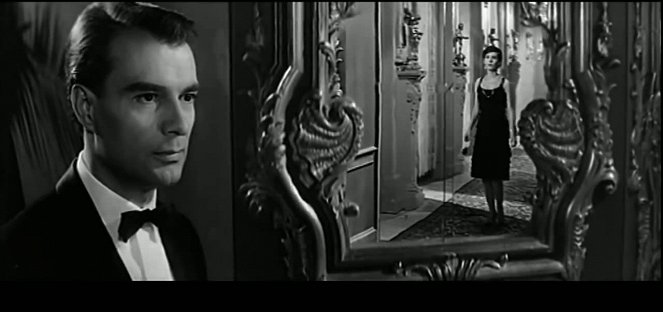Ohjaus:
Alain ResnaisKäsikirjoitus:
Alain Robbe-GrilletKuvaus:
Sacha ViernyNäyttelijät:
Delphine Seyrig, Giorgio Albertazzi, Sacha Pitoëff, Françoise Bertin, Françoise Spira, Luce Garcia-Ville, Pierre Barbaud, Jean Lanier, Alan Edwards (lisää)Juonikuvaukset(1)
In Alain Resnais's masterwork, each fantasy-laden, heavily dramatized, aesthetically perfect scene is dictated by the memories of a man (Giorgio Albertazzi), who is one of many elegant, aristocratic guests vacationing at the enchanting resort, Marienbad. Because the story consists of foggy memories that may or may not be accurate, the film unrolls like a repetitious dream. In the opening sequences, the man describes the immensity and silence of the lavishly decorated baroque hotel as the camera roams its empty hallways. Soon after, the hotel guests appear, assembled for a theater production inside the hotel. Like the actors in the play, the characters in the film make it obvious that they are also playing established roles and reciting lines. Sometimes they simply pose as the camera passes over them, while at other times, they stand like statues, trying to remember what happened last year. They amuse themselves with parlor games, ballroom waltzes, target practice in the shooting gallery, and strolls through the garden. Meanwhile, the man establishes the abstract plot about a love affair he began last year with a woman (Delphine Seyrig), reconstructed from his partial memories. She remembers nothing of the affair, not even the man's name. In fact, most of the guests cannot even recall the year in which these things might have happened--was it 1928 or 29? (jakelijan virallinen teksti)
(lisää)Arvostelut (5)
Locked on the canvas. It cannot be explained, cannot be fully understood. It can only be interpreted, and that, combined with its increasing hypnotic effect, keeps me from being able to sleep. That's why I still don't know whether it's about death, reconciliation, violence, love, a woman's destiny, everything, or nothing. But because nobody else, perhaps only the authors themselves, knows for sure, I enjoy this uncertainty all the more. If it wasn't for the repetitive opening sentences that became tiresome, when I didn't know whether to laugh or grit my teeth, my rating would possibly be the highest possible.
()
The film is cold, remote, and impenetrable, as if created for eternal seekers of hidden meanings, allowing them to engage with an infinite number of interpretations. The film definitely has significance for film theorists and cinephiles due to the wide range of film elements that the director worked with, whether it be choreographic visual compositions, camera movements, or narrative structure based on repetition and variations of the same situations. The average viewer will most likely avoid the film - and rightly so, as Resnais has nothing to offer them. I assumed that I would not watch this film, and my intuition was correct, but as they say: I at least tried. I will not rate it with stars, as it is simply an encounter with extraterrestrials from Aldebaran for me.
()
I hereby nominate Marienbad as the most boring place in film history. Out of respect for the film's novel narrative experiments and languid, spatially disjointed cinematography, I rate it a happy average, but with a huge warning to anyone who fell in love with the film for its authentic conveyance of plot and emotion – this is not art for us, thank goodness.
()
The unreliability of consciousness and memory in film (and indeed in general) is a theme of mine, so Last Year at Marienbad should be a film made specially for me. Unfortunately, though, I can't project that consciousness onto characters who are merely inanimate archetypes moving through a "mere" narrative experiment. Clearly the point here is that it is better to reminisce about the film than to watch it in this case. The way it works with changes in facts and reality is often very familiar, but I don't think it's likely the right question to ask if it's a good or bad film, but rather if it's a film for the cinema or for the gallery. Anyway, getting back to the archetypes, Marienbad itself actually depicts something of a pejorative archetype of the French art film (it also almost 100% served as the inspiration for Monty Python's French Subtitled Film sketch) as you can tell from the enlightened positive reviews and the horrified voice of people who simply wanted a film that made sense for at least four minutes. PS: this may sound like a bizarre comparison, but I would probably have accepted the film more on the level of a dreamlike experience if I hadn't been utterly exhausted in this regard by Nolan's Tenet, which for me also fulfills the definition of cinematic avant-garde and which I still haven't managed to shake off completely.
()
No matter how revolutionary the film may be in terms of its narrative, it won't change the fact that it won't be particularly entertaining for you and that frustration may arise from watching it. There are films that shaped cinematic history, but that doesn't mean you will like them. For me, this film is one of those revolutionary yet uninteresting pieces.
()

